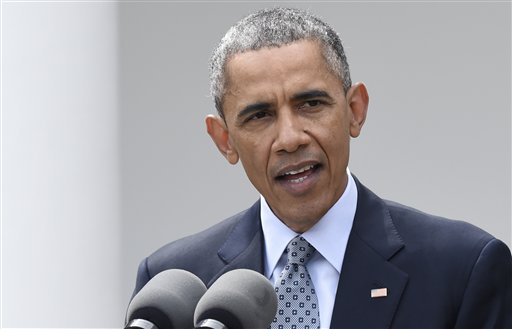US says it’s receptive to nuclear talks with North Korea

In this April 2, 2015 file photo, President Barack Obama speaks in the Rose Garden of the White House in Washington about the breakthrough in the Iranian nuclear talks. AP
WASHINGTON — After three years of diplomatic deadlock, the Obama administration says it is open to holding preliminary talks with North Korea to probe its intentions and assess the prospects of ridding the country of nuclear weapons.
A senior South Korean envoy traveled to Washington and Beijing this past week as nations involved in long-stalled aid-for-disarmament negotiations consider their diplomatic options. Tensions have eased a little on the Korean Peninsula following the completion of annual U.S.-South Korean military drills.
But it remains unclear if a diplomatic overture to North Korea will even get to first base as the Asian nation appears intent on retaining its nuclear weapons. U.S. officials don’t believe the North has demonstrated a serious interest in re-engaging on the issue, and a spokesman at the North Korean diplomatic mission at the United Nations declined to comment on the question of re-engagement.
President Barack Obama has broken the ice with several other long-standing adversaries, like Iran, Cuba and Myanmar. In the case of Iran, the U.S. has joined with other world powers in negotiating a framework agreement to prevent Tehran from obtaining a nuclear weapon.
North Korea has gone far beyond that point. The North conducted its first nuclear test in 2006, and despite international sanctions intended to prevent Pyongyang from obtaining sensitive technology and starve it of funds, U.S.-based experts are forecasting that it could increase its nuclear arsenal from at least 10 weapons today to between 20 and 100 weapons by 2020.
Article continues after this advertisementThat’s a powerful incentive to give diplomacy another shot, but there’s a gulf between North Korea’s desire to be recognized as a nuclear power, and the sworn aim of the negotiating process that China, Japan, Russia, South Korea and the U.S. say they want to revive: denuclearization of the Korean Peninsula.
Article continues after this advertisementThe last public U.S. attempt to negotiate a nuclear freeze and get the six-party process restarted collapsed in 2012 after the North launched a long-range rocket. North Korea conducted its third nuclear test in February 2013, and has test-fired numerous shorter-range missile since then.
The U.S. quietly proposed a meeting with North Korea this January, before the recent U.S.-South Korea military exercises. The two sides, however, failed to agree on who could meet and where.
China, North Korea’s traditional benefactor, has constantly pushed for resumption of dialogue, and South Korean envoy Hwang Joon-kook, who met separately with his U.S. and Chinese counterparts this week, made a very public overture, saying all five parties were ready to have talks to probe North Korea’s intentions.
“We want to meet with the North first without any conditions to determine whether it has real commitment (toward denuclearization),” he said in Beijing on Thursday.
The U.S. is willing to be flexible about a format for “serious dialogue” with North Korea on denuclearization, a senior U.S. official said. The official was not authorized to be named and requested anonymity to discuss U.S.-North Korea policy.
One possible venue could be the North East Asia Cooperation Dialogue, an annual conference of officials and experts organized by the University of California. It is being co-hosted this year by the Japanese government, and is due to be held in Tokyo toward the end of May. Japan has invited North Korea.
Any talks would need to address thorny issues, including conditions under which the six-party negotiations could resume after a gap of seven years. But the atmospherics remain poor, and U.S.-South Korean military drills will restart in August, which could stoke up tensions again.
In January, the U.S. imposed new sanctions after an alleged North Korean hacking attack on Sony Pictures, and Obama angered Pyongyang soon after when he said in an interview that an isolated, authoritarian regime like North Korea’s will ultimately collapse.
U.S. support for a U.N. commission of inquiry that found North Korea had committed crimes against humanity has also strained relations. At the United Nations last week, an event chaired by U.S. Ambassador Samantha Power on North Korea’s human rights record turned into chaos, as North Korean diplomats insisted on reading a statement of protest, and then stormed out amid shouts from North Korean defectors.